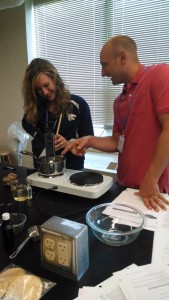E. coli detection, candy making, healthier cookies and nutrient testing, this is all part of a normal week for the attending educators at the Food and Nutrition Science Institute.
FNS Institute provides family and consumer sciences and agricultural education teachers with project-based, scientifically rigorous, food and nutrition science curriculum for high school students. 
“My students can be engaged throughout the entire learning process,” says Ashley Watt (‘09) of her agriculture students at Oxford High School. “What they learn is crucial information but is presented in a fun way.”
FNS Institute is a joint curriculum and professional development project among K-State, University of Nebraska at Lincoln, the Shiga-toxin E. Coli Coordinated Agricultural Project (STEC CAP) grant, and the Nebraska Department of Education.
“I am progressing my classroom to be completely science-based,” says Sarah Molzahn (’07) who teaches agriculture at Thunder Ridge High School in Kensington, Kans., and is pursuing a master’s degree in communications and agricultural education through distance learning.
“As a previous extension agent, I understand the importance of science-based information for our lives, and the lives of students,” says Molzahn.
The FNS Institute works towards the overall goal of the STEC CAP grant to reduce the occurrence and public health risks from E. coli.
“My students get to see the scientific side of how their food is a part of chemistry. They also learn about food safety, such as proper handling and internal temperatures of cooked food,” says Watt.
“Project-based learning will help students apply scientific skills to their everyday lives,” says Molzahn.
